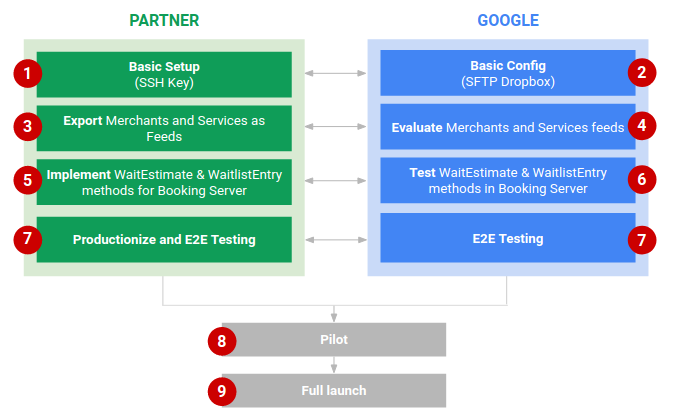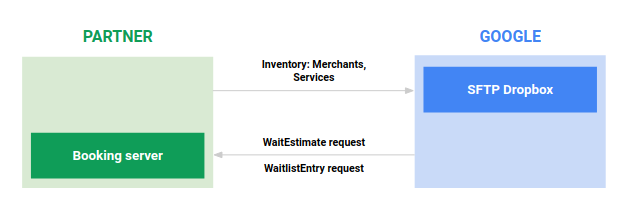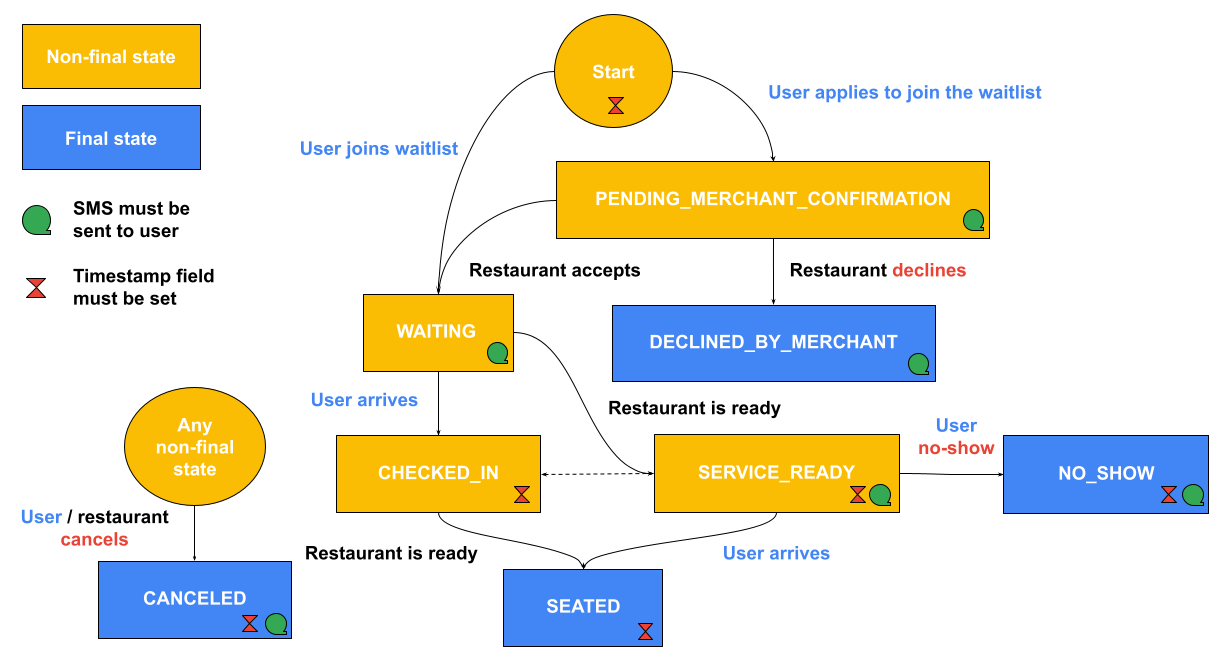Page Summary
-
Reservations Waitlists integration is a process for partners to enable waitlist functionality for merchants on Reserve with Google.
-
The integration involves data flow between the partner and Google, requiring the partner to implement specific booking server methods and provide service feeds with waitlist rules.
-
SMS updates are mandatory for user waitlist notifications, including confirmation, table ready alerts, and cancellations, with a required link to view waitlist status.
-
Different guidelines apply to partners offering only waitlists compared to those supporting both waitlists and reservations, particularly regarding availability feeds and API calls.
-
Google performs test cases for waitlist functionality, including wait estimate retrieval, entry creation, state tracking, and deletion, with specific requirements for handling merchants who manually accept entries or opt out.
Partners participating in the Reservations Waitlists program must complete the account Setup before they begin. However, some steps in the general guide aren't necessary for use of the waitlist feature. The guidelines on this page explain what steps apply to partners interested in using the waitlist feature on Reserve with Google. We suggest that you read through this overview before going through the integration steps.
Launch process
Figure 1 outlines the process to launch your waitlist-enabled merchants on the Actions Center.

Overall, the major data flows between you (the Partner) and Google are captured in Figure 2:

Guidelines for all Reservations Waitlists partners
Keep the following in mind as you implement the Reservations Waitlists feature:
- The service for every Reservations Waitlists merchant must have
waitlist_rulespopulated.- You must use the same service for both waitlist and reservation. In other words, if your restaurant also allows reservations, just add the waitlist related metadata to the service for reservation.
- Sending out SMS updates is required for the waitlist implementation in
the following cases:
- To confirm the user has successfully joined the waitlist.
- To notify the user that their table is ready.
- To notify the user that their waitlist entry has been cancelled.
- SMS messages must contain a link to a page where users can view their waitlist status.
- Waitlist-only merchants do not need to provide availability feeds to the Actions Center.
- Your booking server must implement all the waitlist-specific steps listed in Implement the booking server. Partners that support both reservations and waitlists can add on the new methods to their existing booking server.
- The Actions Center runs a set of test cases for the waitlist methods in the booking server.
Status flowchart
This chart describes the statuses that must be reported in
WaitlistEntry.waitlist_entry_state
when responding to
GetWaitlistEntry
calls. The chart also indicates when to record and populate the
WaitlistEntry.waitlist_entry_state_times.*_time_seconds
fields and when to send an SMS to the user to inform them they have entered a new state.

Common edge cases
The following are common edge cases in a Reservations Waitlists integration and preferred solutions for them.
-
If some (but not all) party sizes are not accepting new waitlist
additions because there is no wait on these party sizes then returning
WaitEstimatesfor all party sizes in theBatchGetWaitEstimatesresponse and allowing users to join the waitlist for these party sizes with no wait is preferred. Return aWaitLengthwith 0parties_ahead_countand/or with anestimated_seat_time_rangewith 0start_secondsand with 0end_secondsfor theparty_sizes with no wait -
If one or more party sizes are not accepting new waitlist additions
because the wait has become too long then omitting
WaitEstimatesfor those party sizes in theBatchGetWaitEstimatesresponse is preferred.
These approaches are preferred since they give the user options even though the merchant's waitlist may not be fully open.
Guidelines for Reservations Waitlists-only partners
Keep the following in mind if the booking server is used only for waitlists:
- Reservations Waitlists-only partners don't provide availability feeds to Reserve with Google.
- Reservations Waitlists-only partners do not implement the reservation methods in their booking server. Instead, you Implement the booking server with the instructions for the Waitlist implementation.
- Reservations Waitlists-only partners do not make API calls to Google. This means that Reservations Waitlists-only partners do not need to set up a cloud project or provide a developer email address. You do not need to complete Real-time API updates. However, merchant and service feeds still need to be provided to the Actions Center.
Guidelines for partners whose merchants must manually accept/reject waitlist additions
If your merchants require the ability to manually accept or reject new waitlist additions from Google, extra steps are required:
- Set the
waitlist_confirmation_modetoWAITLIST_CONFIRMATION_MODE_ASYNCHRONOUSin thewait_estimatefor party sizes which require manual confirmation. This must be set in theBatchGetWaitEstimateResponseand theGetWaitlistEntryResponse. - Waitlist entries that have been requested by the user, but not yet
accepted by the merchant should be in state
PENDING_MERCHANT_CONFIRMATION.
Reservations Waitlists test cases
Google tests the following use cases to ensure the functionality of the waitlist methods in your booking server implementation. Google also tests and monitors latency. All of these tests must pass prior to launch.
WaitEstimate retrieval
- Wait estimates are returned for each party size requested in a
BatchGetWaitEstimatesRequest. - For party sizes which the merchant has the option to accept or reject
new waitlist additions, set waitlist_confirmation_mode to
WAITLIST_CONFIRMATION_MODE_ASYNCHRONOUS.
Waitlist entry creation
- A waitlist entry can be created from a
CreateWaitlistEntryrequest. - If waitlist entry creation fails, a business logic error shows up in the response.
- If a
CreateWaitlistEntryattempt succeeds, the same response is returned when the sameCreateWaitlistEntryis received again. - If a
CreateWaitlistEntryattempt fails, the server retries when the sameCreateWaitlistEntryis received again. - Waitlist entries show up in the merchant's interface.
- Calls to
GetWaitlistEntrysuccessfully return the created waitlist entry.
Waitlist entry states and timestamps
- Verify that each waitlist entry state is returned properly in the waitlist entry of
GetWaitlistEntryresponses. - Verify that each state timestamp is set in the appropriate timestamp field of the waitlist
entry in
GetWaitlistEntryresponses.
Waitlist entry deletion
- Existing waitlist entries can be deleted. The response to a successful
delete must be the empty proto
{}.
Opt out
- Verify that opted out merchants are treated as described in Merchant opt out.
Sample waitlist service feed (JSON)
Waitlist service feedMerchant opt out
Google expects certain responses for merchants that previously had waitlists enabled but have decided to opt out.
Immediate opt out
- Return
CLOSED_OTHERforBatchGetWaitEstimatesrequests. - Return
WAITLIST_CLOSEDforCreateWaitlistEntryrequests. - Return
GetWaitlistEntryrequests properly for users who are already on the waitlist.
Extended opt out
- Remove the
waitlist_rulesfrom the service feed for the merchant if the merchant is not opting out of reservations. - Remove the merchant from the merchant feed if they opt out of all Google integrations.